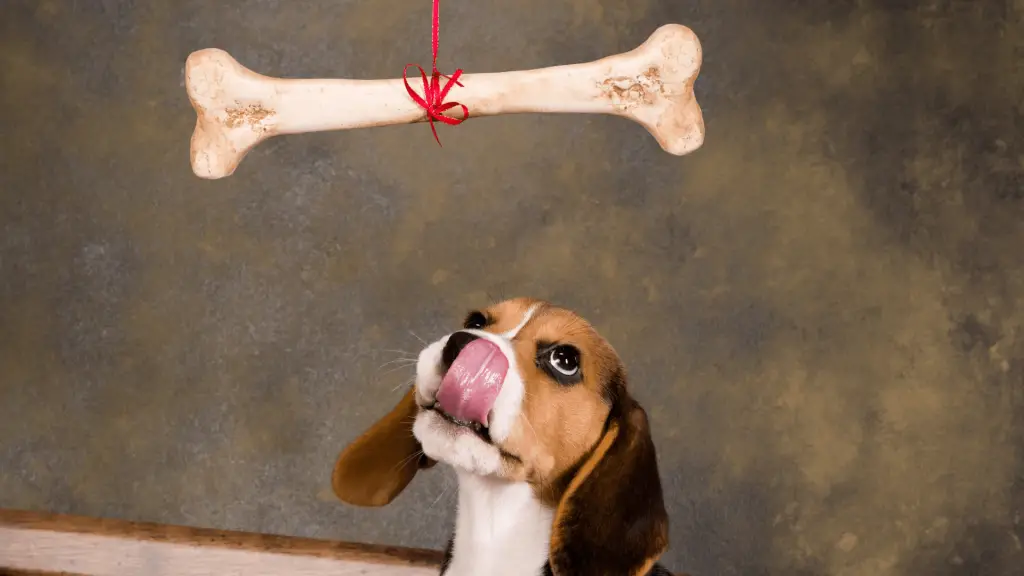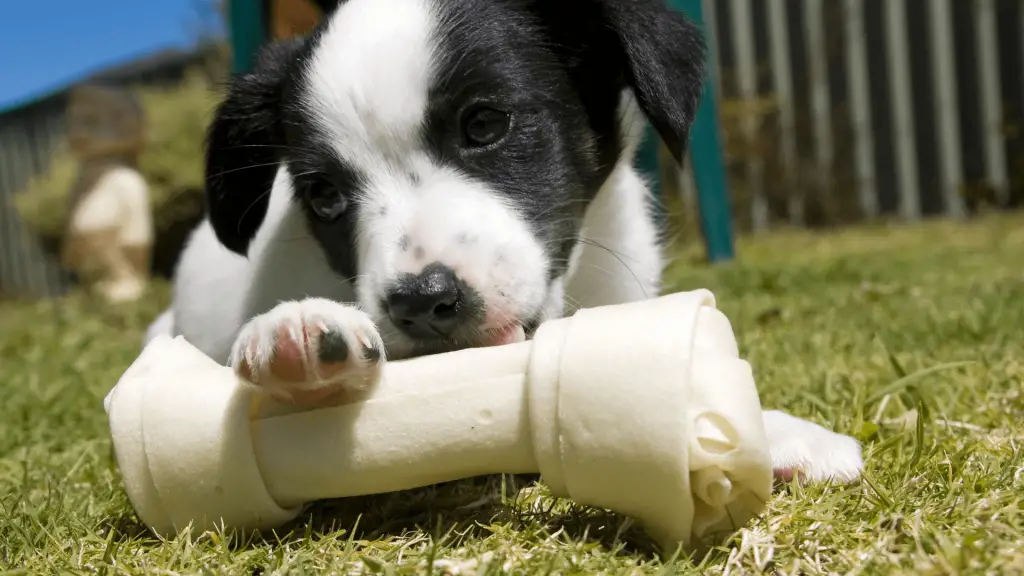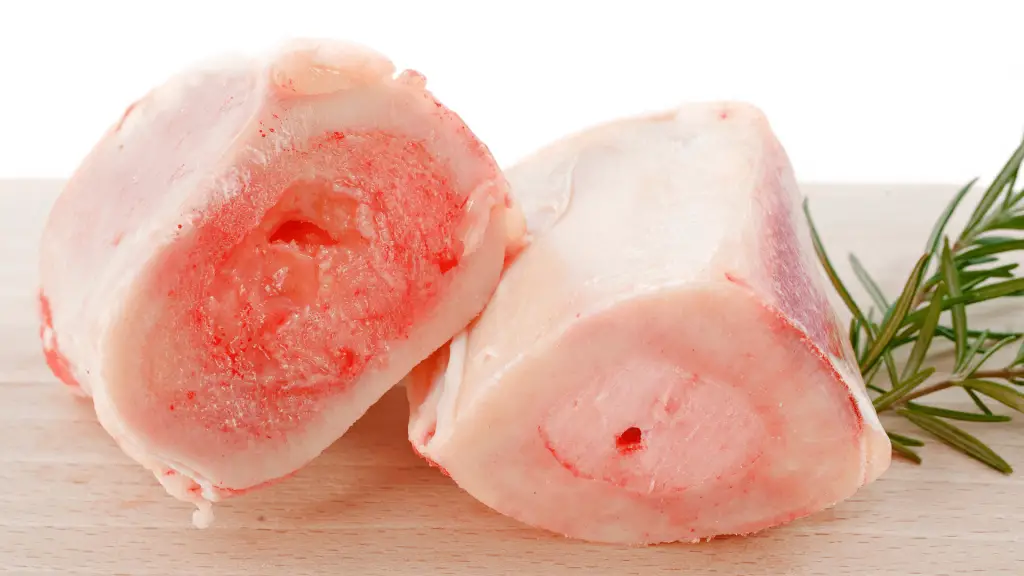Pawscessories is reader-supported. When you buy via links on our site, we may earn an affiliate commission at no cost to you.
Learn more.
At what age can puppies have bones? And what are the best bones for puppies?
Puppies go through different stages of growth and development, so the answer to this question isn’t straightforward. Depending on their age, size, and chewing habits, puppies can have different types of bones.
This blog post will look at what age puppies can have bones and what types of bones are best for puppies 8 weeks, 3 months, 4 months, and 6 months old. We will also discuss which bones you should avoid giving your puppy and how to give them bones safely.
Let’s dive in.
Table of Contents

What Age Can I Give My Puppy A Bone?
The age of a puppy plays a big role in determining whether or not they should have bones. Puppies are still growing and developing for the first one to two years of their lives, so it’s important to be aware of what stage they are in before giving them any type of bone.
Another important note is that puppies will have their baby teeth for about 6 months. After that, they will start to get their much stronger adult teeth.
A puppy’s baby teeth are fragile and can easily break. So hard bones can be risky to give to puppies with their baby teeth.
So, at what age can puppies have bones for it to be considered safe?
Generally, puppies 3 months and older can safely chew a raw bone. Although, it’s probably better to wait until their baby teeth fall out to reduce the risks. Raw bones are the best for pups, as they are packed with nutrients like calcium and phosphorus and help clean their teeth.
Are Bones Good For Teething Puppies?

When your puppy loses their baby teeth, they will experience some discomfort. You might be tempted to give them a bone to help with the pain, but it’s important to know that not all bones are good for teething puppies.
The right type of bone can relieve a puppy’s discomfort by gnawing away on one. However, it’s even better for them if you choose a softer option for their teething.
For example, rubber, wood fibers, and nylon can be toy materials that can act as alternatives to bones. These are softer materials and reduce the risk of harming your pup’s teeth. These generally work better for teething puppies as they soothe their gums without the risk bones have for puppies’ teeth.
If you still rather have a bone for your puppy, we will discuss the best bone for puppies depending on their age below.
What Are The Benefits Of Giving Bones To Puppies?

Many benefits come along with giving bones to puppies. The most notable is that it helps clean their teeth, gives them essential nutrients, and can relieve teething pain for some puppies.
Let’s explain each of these benefits further.
Cleans Your Puppies Teeth And Gums
A big benefit to giving bones to puppies is that it helps clean their teeth. In addition, chewing on a bone can help remove plaque and tartar from their teeth, reducing the risk of gum disease.
Gum disease is actually the leading cause of tooth loss in dogs, so this is a very important benefit. Bones are an option if you are looking for ways to help keep your pup’s teeth healthy and clean.
Packed With Essential Nutrients
Another benefit of bones is that they are packed with essential nutrients that puppies need for their growth and development. For example, bones contain high levels of calcium and phosphorus, which help strengthen a puppy’s bones and teeth.
They also contain other essential nutrients like protein, fat, antioxidants, and cartilage. Most of where these nutrients lie can be found in the bone marrow. All of these nutrients play an important role in a puppy’s health.
So not only do bones help keep your pup’s teeth clean, but they also provide them with some essential nutrients to help them grow and develop properly.
Boredom Buster
Bones can also help keep your puppy entertained and occupied. If you have a puppy that’s full of energy and is always getting into things they shouldn’t, giving them a bone can help redirect their attention and give them something to focus on.
This can be especially helpful if you are trying to crate train your puppy, as they will have something to keep them occupied while they are in their crate. Just be cautious with this. Bones can pose risks to your puppy, so if they are in their crate with a bone, make sure to supervise them.
Teething Relief
Finally, bones can also help relieve teething pain for some puppies. This is because the act of chewing on a bone can help soothe their gums.
If your puppy is teething and you are looking for ways to help them with the discomfort, giving them a bone to chew on could be an option.
What Bones Are Safe For Puppies?
There are many different types and sizes of bones you can give your puppy, so finding one that is the right size for them is important. You also want to make sure you are giving them a bone that is not too hard as it could damage their teeth.
A bone that is safe for a puppy should be the right size for them to chew on. You also want to make sure there are no small pieces that they could choke on.
In addition, you need to consider the type of chewer your dog is. For example, do you think your dog is one to gulp down big pieces of things?
Some of the best bones for dogs are raw beef shank bones. These bones are generally big enough for most dogs that they can’t swallow and are less likely to damage your pup’s teeth.
Let’s look at some of the dangerous bones.
Related Reading: My Dog Ate Fish Bones: What Should I Do? (Vet Answers)
What Bones Are Dangerous For Puppies?

As we mentioned before, it is important to ensure the bone you give your puppy is not too hard as it could damage their teeth. You also want to stay away from bones that are small enough for them to choke on or splinter easily.
Some of the most dangerous bones for puppies include:
Cooked bones
Cooked bones are more likely to splinter and can cause serious injury to your puppy if they swallow them.
Rib bones
Rib bones are small and brittle, which makes them easy to break and swallow. They can also splinter easily and cause serious injury to your puppy if they eat them.
Pork Bones
Pork Bones are also small and can splinter easily. They can also be a choking hazard for your puppy.
Small Bones
In general, you want to avoid giving your puppy any type of small bone as they can easily choke on them.
Antler Bones

Antler bones are very hard and can damage your puppy’s teeth. Puppies under the age of 6 months should stay away from antlers. Once they have their adult teeth, they can start to chew on them.
Now that we have looked at some of the best and worst bones for puppies let’s talk about how
Now that we have looked at some of the best and worst bones for puppies let’s talk about how to give them bones safely.
How To Give Puppies Bones Safely
What Are The Risks Of Giving Puppies Bones?
Now that we have looked at what bones are safe for puppies and which ones to avoid let’s look at some of the risks involved with giving your puppy a bone.
Choking
One of the biggest risks is that your puppy could choke on the bone. This is why it is so important to make sure you are giving them a bone that is the right size and not one that they can easily break into small pieces.
If you are unsure if the bone you have is too small, it is better to err on the side of caution and not give it to them.
Gastrointestinal Obstruction
Another risk is that your puppy could swallow a piece of the bone that is too big, and it could get stuck in their intestines. This is called a gastrointestinal obstruction and can be very serious.
Symptoms of a gastrointestinal obstruction include:
- Vomiting
- Lethargy
- Diarrhea
- Abdominal pain
- Decreased appetite
Suppose you notice any of these symptoms in your puppy after eating a bone. In that case, it is important to take them to the vet immediately.
Cracked Teeth
Another risk of giving your puppy a bone is that they could crack one of their teeth. This is more likely to happen if you give them a bone that is too hard or if they chew on it for too long.
If you notice your puppy is having trouble chewing, is drooling more than usual, or has blood in their saliva, it is important to remove the bone and check their teeth.
They may have a cracked tooth and will need to see the vet.
As you can see, there are some risks involved with giving your puppy a bone, but if you choose the right type of bone and supervise them while they are chewing on it, it can be a safe and fun activity for them.
So what are the best bones for puppies?
What Are The Best Bones For Puppies?

Now that we have looked at what bones are safe for puppies and which ones to avoid let’s look at some of the best bones for puppies.
In general, the best bones for a dog will be raw and edible. For example, Raw chicken, turkey, lamb, or beef bones are soft enough to chew, eat and digest.
However, they need to be the right size. In addition, regardless of these bones being okay for dogs, they will still pose a risk if your dog does not chew properly or if the bones are too hard for them.
*Important safety tips: Always supervise a dog with a bone, throw out gnawed bones, make sure they cannot swallow the bone whole, and only let them chew for about 15 minutes at a time.
Raw Beef Shank Bones
Raw beef shank bones are a great option for puppies as they are big enough that they can’t swallow them, and they are less likely to damage your pup’s teeth.
Knuckle Bones
Knuckle bones are another good option for puppies as they are big and have a lot of meat on them for your pup to chew on.
Just make sure you remove all the meat before giving it to your puppy, as it can be a choking hazard.
Raw Chicken, Lamb, Turkey, & Duck Bones
Raw chicken lamb, turkey, or duck bones can be an okay option for puppies as they are soft and easy to chew. Large puppies should not be given any chicken bones that they can swallow whole.
Some people will argue that these bones pose too much risk. However, some people disagree and think they are great for dogs.
When feeding them these types of bones, expect dogs to crunch them up and eat them.
Just make sure they are raw and big enough that your dog cannot swallow them whole. In addition, if your dog tends to be a gulper and doesn’t chew most of their food, these bones won’t be the best option.
Can Dogs Eat Bones With Marrow?

Puppies under 8 months should not have bones with marrow.
Marrow is the fatty tissue inside the bone and can cause pancreatitis in puppies. In addition, they are generally way too big for a puppy to get their mouth around.
A puppy should be at least 8 months or older, have all their adult teeth, and be big enough to handle the marrow and the size of the bone.
Once they meet these requirements, dogs can get many benefits from marrow.
Marrow is a good source of protein, essential vitamins, and minerals like calcium and phosphorus. However, when the marrow is gone from these bones and dried up, make sure to take the bone away. It becomes brittle at this point.
Best Bones For Puppies 8 Weeks
Puppies 8 weeks old should not be chewing on bones. Instead, they should be given soft chews meant for teething puppies.
This will help with the pain of teething and also help to clean their teeth. Once they are about 3 months old, you can start to introduce some bones to them.
Best Bones For Puppies 12 Weeks And 4 Months
Puppies 12 weeks or 4 months old can start to have some bones, but only for short periods and under supervision. You will want to start with softer bones like chicken or turkey necks.
As they get older and their teeth get stronger, you can move onto harder bones like knuckle bones.
When giving your puppy a bone, make sure it is raw, has no marrow, and is the right size for them to chew on.
What Do You Do If Your Puppy Eats Cooked Bone?
So what do you do if your dog ate some cooked bones?
If your dog got their paws into some cooked bones, here is what I learned from our veterinary, Dr. Littlejohn.
Vets will usually ask the following things:
- How long ago did they eat the bones?
- How much did they eat?
- How big were the bones?
- How big is the dog?
- Have you noticed any changes in your dog’s behaviors?
- Are they drinking water?
- Any signs of physical pain or discomfort? Vomit? Diarrhea? Blood?
- What’s the color of your dog’s gums?
These questions help the vet examine the situation to determine the level of risk. For example, If you have a tiny dog that ate large cooked bones, they are at a much greater risk than if large dogs ate them.
Knowing the common questions, a vet will ask can help you understand what you need to look for. Since each scenario will be unique depending on the size, amount eaten, and how big your dog is, there’s no one size fits all answer.
The only thing you can do when a dog eats cooked bones is to wait and see if they start showing any symptoms of discomfort. Avoid trying to induce vomiting. This can cause more harm than good and could seriously damage your dog if the bones have already started to break down in their stomach.
Here are some symptoms of bones being stuck in a dog’s stomach:
- Fever
- Blood In Stool
- Pale Gums
- Not Eating Or Drinking
- Vomiting
- Abdominal Pain Or Swelling
If your dog shows any of these symptoms, it’s best to take them to the vet immediately.
Click here if you wish to speak with a vet online right now.
Important note: Small dogs are at the greatest risk since they have tiny digestive tracts! This means cooked bones can do much more damage, and it takes less of them.
Other Frequently Asked Questions
What Age Can Puppies Have Rawhide?
Puppies can start to have rawhide at around 6 months old when they finish teething. You will want to ensure it is big enough that they cannot swallow it and that you supervise them while chewing it.
Related Readings: Are Rawhide Chew Toys Bad For Dogs? Risks and Benefits
Are Pig Ears Okay For Puppies?
Pig ears are soft and fatty. For these reasons, they can cause gastrointestinal upset in puppies. Therefore, I would not recommend feeding them to a puppy that is less than a year old.
In addition, pig ears had a salmonella outbreak in 2019, so the FDA does not recommend them, but that’s up to you to decide.
Can 6-Month-Old Puppies Have Bones?
Yes, six-month-old puppies can have bones as long as they are raw, have no marrow, and are the right size for them to chew on. You will want to start with softer bones like chicken or turkey necks, and as they get older and their teeth get stronger, you can move onto harder bones like knuckle bones.
Are Greenies Good For Puppies?
Bone treats like greenies can be given to puppies around 6 months old. You will want to make that you are not overfeeding them with these. In addition, if your dog tends to swallow things whole, these might not be the best option. They could get stuck in their throat and cause them to choke.
Final Thoughts
Puppies can have bones as young as 12 weeks old, but it is important to make sure they are the right size and type of bone.
You will also want to consider the type of chewer your puppy is before giving them any type of bone.
Remember, all toys, bones, and chews should be supervised until you are confident your puppy can handle them on their own. There will always be risks when giving your puppy bones, but as long as you do your research and find the right type of bone for your puppy, those risks can be mitigated.
If you have any questions or concerns, it is always best to speak with your veterinarian.
Happy bone chewing!
Other posts you might find interesting:
7 Simple Steps To Feeding Your Puppy (#4 Is Crucial)
Can Dogs Be Retarded? (Identifying Mentally Challenged Dogs)
Do Dogs Get Tired Of Barking? How To Stop Excessive Barking?
